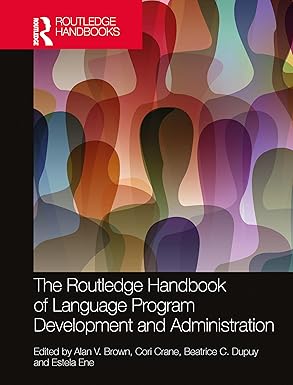
The Routledge Handbook of Language Program Development and Administration
Author(s): Alan V. Brown (Editor), Cori Crane (Editor), Beatrice C. Dupuy (Editor), Estela Ene (Editor)
- Publisher: Routledge
- Publication Date: 30 Jun. 2025
- Edition: 1st
- Language: English
- Print length: 670 pages
- ISBN-10: 1032420243
- ISBN-13: 9781032420240
Book Description
Second language program development and administration is a long-standing area within the larger field of applied linguistics. In many ways, it is the quintessential applied linguistics field, as it crosses disciplinary boundaries while balancing the rigors of scholarly inquiry with the demands of practical application without losing sight of concrete learner outcomes.
The Routledge Handbook of Language Program Development and Administration provides a scholarly rigorous, yet practically relevant treatment of issues implicated in program development and administration with 52 chapters written by leading scholars in the field. Authors not only address the theoretical underpinnings of their respective topics but also provide actionable, evidence-based recommendations concerning eminently practical matters. In this way, the volume provides both novice and experienced language program administrators with important guidance on how to think about the work that they do and how best to go about it, while also validating language program administration as a scholarly area of inquiry.
The Routledge Handbook of Language Program Development and Administration is essential reading for practicing second language program administrators at the post-secondary level, in-service and pre-service second language instructors, graduate students in applied linguistics, and even upper-level undergraduate education students considering second language teaching as a future career.
Chapters 9 and 11 of this book are freely available as downloadable Open Access PDFs at http://www.taylorfrancis.com under a Creative Commons Attribution-Non Commercial-No Derivatives (CC BY-NC-ND) 4.0 license.
Product description
Review
This volume pulls together the experiences and expertise of an impressive range of scholars and practitioners to provide an invaluable resource that goes well beyond the practicalities of language program direction and into the very essence of language teaching and learning. It answers questions I didn’t even know I had!
– Gillian Lord, the University of Florida
This handbook is an invaluable resource that provides theory-informed, practical strategies for effective language program development and administration while also elevating the field as a respected area of scholarly inquiry. Its broad scope and globally diverse contributors make it a comprehensive guide for advancing quality language education.
– Gabriela Kleckova, the University of West Bohemia
This comprehensive collection of papers tackles established and cutting-edge issues in language program development and administration and exemplifies the complexity of establishing and maintaining an effective program. The state-of-the-art papers by
leading SLA researchers, program and language center directors, materials designers, and administrators are written clearly and explore topics in depth. This volume was badly needed as a reference, and it will empower language program directors to communicate with authority to all constituents at their institutions.
– Susanne Rott, University of Illinois, Chicago
Edited by four excellent experts in second language program management and articulation, curriculum development, and language teacher education, this remarkable volume covers in extraordinary depth an impressive array of important topics related to language program development and administration: implications of second language acquisition research in language programs; assessment and evaluation of language programs; issues in language teacher education; curriculum and materials; different contexts for language programs; the training of experts and leaders in program development and administration; and the role of new technologies. To this end, the editors have carefully assembled a wide-ranging group of scholars, practitioners, and administrators working in diverse academic and institutional contexts. In doing so, the editors of this indispensable handbook have succeeded in confirming that second language program development and administration is quite possibly “the quintessential applied linguistics field” because of the way in which the chapters make valuable connections between sound theory, language education research methodologies, concrete and empirical data, programmatic demands and issues, and of course, concrete learner needs and outcomes.
– Manel Lacorte, University of Maryland, College Park
About the Author
Alan V. Brown is Professor of Spanish Applied Linguistics at the University of Kentucky in Lexington, United States. His research has explored a variety of topics related to Spanish language teaching and learning, from course grades to metalinguistic awareness to the relationship between temporal fluency, lexical diversity, and proficiency.
Cori Crane is Associate Professor and German Language Program Director at the University of Alabama, United States. Dr. Crane’s research interests align to her curriculum development and teacher mentoring work, with recent and current projects located in language teacher education, second language literacy development, and practitioner research.
Beatrice C. Dupuy is Professor of French, Public and Applied Humanities, and Second Language Acquisition and Teaching at the University of Arizona, United States. She directs the Center for Educational Resources in Culture, Language, and Literacy. Her scholarship focuses on multiliteracies in language education and language educator professional learning.
Estela Ene is Professor of English at Indiana University Indianapolis, United States. She chairs the English Department, directs the English for Academic Purposes Program, and teaches EAP and TESOL. Her research focuses on EAP/ESL writing, teacher and program development, CALL (including corpus and e-feedback), internationalization, and intercultural competence/communication.